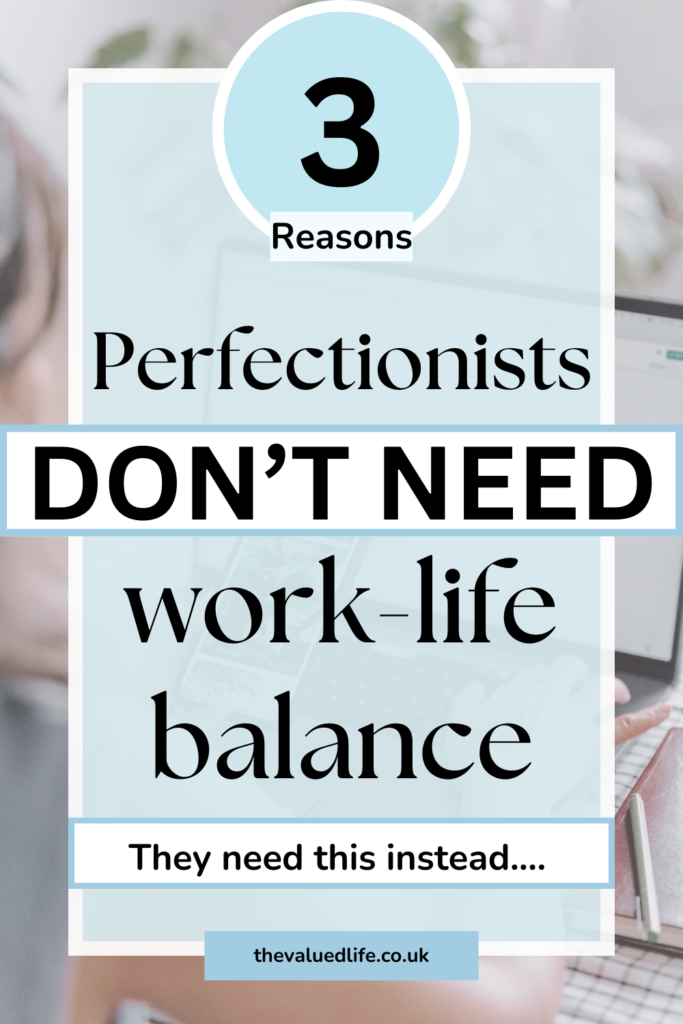I may be saying something quite controversial today but I truly believe work-life flow is better than work-life balance ESPECIALLY for perfectionists.
There has been a big push in recent years for work-life balance.
It’s the new buzzword that companies are using to promote how amazing their working culture is. Everyone and their mum is talking about work-life balance and giving tips on how to find it, design it and improve it.
HR departments are spending hours each week promoting content via company newsletters encouraging their employees to seek the magical ‘work-life balance’ ignoring the fact that their working culture and structure is set up to create anything but that.
And another thing, is work-life balance even something that is achievable?
And if it IS achievable, is it necessarily something we should strive for?
Questions, questions, questions.
As a Mindset & Productivity Coach for perfectionists, I’ve seen first-hand how difficult it is for high-achieving perfectionists to find this elusive work-life balance which is why I promote work-life flow instead.
This page might contain affiliate links. In the event of a sale, I will be awarded a small commission (at no extra cost to you).
Are you a perfectionist?
So, before we jump into the meat and bones of this blog post, I thought I would do a quick crash course into the signs you might be a perfectionist:
- You struggle with all-or-nothing thinking
- You have unrealistically high standards for yourself and others
- You tie your self-worth to your career, education or achievements
- You constantly go through cycles of go-go-go and burnout
- You struggle with procrastination
- You find it hard to let go and want to control the outcome as much as possible
- You have a big fear of failure and never feel good enough
If you recognise any of these signs then… congratulations (or commiserations) you have increased your self-awareness and now know you are a perfectionist.
Related Post: 7 easy ways for perfectionists to increase their self-awareness
My problem with work-life balance
My main problem with work-life balance is that it acts like work and life are two opposite ends of the spectrum when in reality work is part of life. In fact, it is a BIG part of our life with many of us spending 40 plus hours of our week working or travelling to work.
To act as though work and life were 2 completely different mutually exclusive things is doing a disservice to ourselves.
However, I do acknowledge that we needed the narrative of work-life balance to exist to prompt a paradigm shift in our working culture – i.e. to counter hustle culture and the idea that work and grinding should be our WHOLE life.
So I’m not crapping wholly on work-life balance, I am just recommending that we build on the premise to create a more realistic and achievable representation of how we live our lives, especially in our post-pandemic society.
Work-life balance WALKED so work-life flow could RUN.
Related Post: How to be productive every day – 13 ESSENTIAL mindset shifts!

Why work-life balance doesn’t work for perfectionists
The concept of work-life balance can be detrimental for perfectionists, especially during their healing journey for several reasons:
1. Unrealistic expectations:
Perfectionists LOVE to set ridiculously high standards for themselves so when they begin their healing journey of breaking the cycle of procrastination and burnout they may be tempted to set their sights on achieving ‘work-life balance’.
Work-life balance is heavily marketed as something achievable however in reality it is incredibly unrealistic to get a 50/50 split between work and life. So unfortunately if you’re a perfectionist, you will start your healing journey with yet another unrealistic goal.
Ultimately, resulting in the build-up of guilt and shame when you struggle to find the balance on a consistent basis
Related Post: How to let go of productivity shame and live your best life
2. All-or-nothing thinking
The idea of work-life balance falls right into the perfectionist trap of all-or-nothing thinking.
So if you are already susceptible to approaching life this way it will be so easy for you to approach your healing journey with rigidity. This will inevitably cause you problems when stress from work spills over into your personal life (or vice versa) disrupting your sense of control.
Part of the perfectionist healing journey involves breaking down the walls of control, embracing imperfection and learning how to be okay with the grey area (uncertainty) in life. Slapping work-life balance into the mix as a goal just slows down the healing journey.
Related Post: How to be your best self in times of uncertainty
3. Goals-driven rather than values-driven
I am a big believer in values-based living (or values-driven living), I talk about it in pretty much every blog post. In fact, my whole brand ‘The Valued Life’ is based on the premise of values-based living so I need to highlight some of the ways work-life balance goes against my philosophy.
I truly believe perfectionists need to adopt a mindset that focuses on aligning their lives to their values rather than solely on their goals. Drinking the work-life balance Kool-Aid falls into a more goals-driven life. For example, as a perfectionist, you might focus on heavily time-blocking and tracking the number of hours worked vs spent on leisure. Possibly forcing yourself to do specific things such as going to a set number of social events to prove that you are living a balanced life.
I think it’s more important to focus on being present in the moment and making decisions that are in alignment with your values. You know, actually prioritising things that are meaningful and enable you to live the life that you want to live holistically rather than ticking things off your checklist.
Related Post: Start living a values based life to be successful

How is work-life flow different from work-life balance?
Work-life flow is about personal accountability, self-trust and boundaries.
It’s an acknowledgement that we live in an imperfect world which means it is impossible to neatly package up our work and life into 2 equal boxes.
Whereas, in reality, there are 8 different areas of your life:
- Personal and spiritual growth
- Friends and family
- Career and business
- Finances
- Fun and recreation
- Romantic relationships
- Physical environment
- Health and Fitness
The goal is to find harmony between the 8 areas of your life and flow between filling each cup when needed.
It requires a much more intentional but fluid approach than just separating work and life into generic categories.
Everyone has busy and quiet seasons at work. Sometimes, your career has to take the front seat in your life so you prioritise that area. Other times, your health and wellbeing needs to come first. Or your role as a parent etc…
Moreover, some people LOVE working and it is a genuinely joyful part of their life so telling them to find work-life balance is infuriating for them.
For example, I found this article from Business Insider talking about why top CEOs like Jeff Bezos, Arianna Huffington, Elon Musk and Jack Ma ‘hate the phrase ‘work-life balance’’. It is an interesting read and I don’t necessarily agree with their viewpoint as I am FIERCELY anti-hustle culture but I do relate to the idea that ‘balance’ implies a trade-off and/or promotes guilt.
At the end of the day, you need to be able to work WITH yourself (mind, body and soul), rather than forcing yourself to work outside of your limits, ensuring that your activities are in alignment with your natural rhythms and core values.
Work-life flow is heavily centred around the theme of mindful productivity which involves:
- Combining energy management with time management practices: aligning your energy-draining and energy-boosting tasks with your natural energy peaks/dips
- Checking in with your needs and emotions: journaling, therapy, coaching and mindfulness are ways you can check in with yourself
- Setting boundaries around your needs and communicating them clearly: this will prevent you from burning out or pushing yourself to do things that are not in alignment with your needs
- Blending self-care into your daily routine: ensuring that self-care is not something that just happens in the ‘life’ compartment but is present throughout your working day
- Designing your life around your optimal mental and physical states: creating a lifestyle that supports you and builds you up for consistent success
- Letting go of the idea of perfection and forgiving yourself: Accepting that perfection doesn’t exist and that things don’t always go to plan
- Being mindful in your approach to life – i.e. aiming to be present in all activities (even the boring ones!)
Related Post: 5 energy management techniques to elevate your life
Reasons why you should aim for work-life flow as a perfectionist
- Enables you to embrace imperfection
- Allows flexibility and adaptability
- Focuses on quality over quantity
- Prioritises wellbeing/self-care
- Reduced stress
- Encourages energy management
- Allows you to focus on living a life in alignment with your values
- Helps you set boundaries
- Guilt-free living
Related Post: 5 ridiculously simple ways to practise mindfulness and calm your mind
Book recommendations to create work-life flow
- The body keeps the score by Bessel van der Kolk
- Atomic Habits by James Clear
- 7 Habits of Highly Effective People by Stephen Covey
This page might contain affiliate links. In the event of a sale, I will be awarded a small commission (at no extra cost to you).
Related Posts:
- 4 Stupidly Simple Ways To Develop a Work-Life Flow
- 7 easy ways for perfectionists to increase their self-awareness
- 5 energy management techniques to elevate your life
- How To Have A Guilt-Free Self-Care Day
- 123 Affirmations For Growth Mindset and Success






